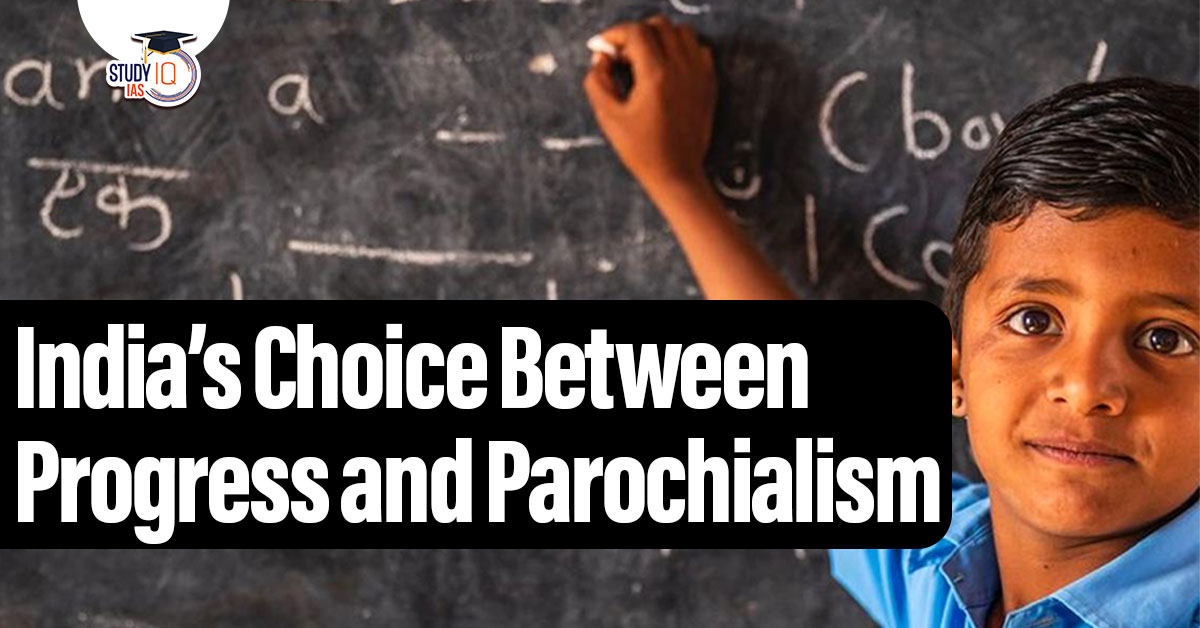Table of Contents
Context: Linguistic policies risk undermining India’s global and technological ambitions.
Progress and Parochialism: Importance of English in Global And Technological Sphere
- Global Language of Business and Technology: English dominates global trade, business communication, and technological research.
- Over 93% of global technical courses, research papers, and patents are published in English.
- AI, cybersecurity, and data science fields rely heavily on English for collaboration and innovation.
- Gateway to Higher Education and Employment: Most global universities and research institutions use English as the medium of instruction.
- 82% of remote tech roles demand English proficiency.
- Lack of English skills reduces access to high-growth sectors by 68%–85%.
- Diplomacy and Global Influence: English is the working language of international organizations (UN, WTO, IMF, etc.).
- It is essential for soft power, including media, entertainment, and international relations.
- Cultural and Technological Exchange: English facilitates global cultural exchange, from Hollywood to K-pop to tech forums.
- It enables access to global knowledge networks and innovation hubs.
- AI and Digital Economy: AI models and coding languages are predominantly built on English.
- Data sharing, global collaborations, and industry standards are all English-driven.
- Tourism and Hospitality: English is the global standard for tourism, hospitality, and customer service industries.
- Countries with higher English proficiency attract more international tourists and business investments.
Issues in India
- Linguistic Nationalism vs Economic Necessity: Push for Hindi and regional languages in education and government policies undermines global competitiveness.
- Maharashtra’s mandate for Marathi in government offices reflects this tension.
- Educational Disparity: Just 10% of Indians are fluent in English, creating a two-tier education system.
- Private school students gain access to global opportunities, while government school students face limited prospects.
- Employment Barriers: NITI Aayog identifies English proficiency as a major barrier to employment in high-growth sectors.
- Industries are forced to hire outside talent due to lack of English-speaking workforce.
- Regional Disparities: States like Kerala and Tamil Nadu, which emphasize English and mother tongues, have higher STEM enrolment and employment rates.
- Hindi-first states lag behind in educational and economic outcomes.
- Policy Ambiguity: National Education Policy (NEP) 2020 promotes multilingualism but lacks clarity on prioritizing English for competitive skills.
- Lack of systemic investment in English training leads to inconsistent outcomes.
- Social and Cultural Resistance: English proficiency is viewed as cultural betrayal by some political and social groups.
- Pushback against Western influence creates resistance to learning English.
Global Best Practices
- China: Since 2001, English has been taught in primary schools.
- The Gaokao (national entrance exam) includes English as a core subject (150 points).
- Huawei and other major firms have in-house English language programs.
- English proficiency supports China’s global infrastructure expansion under the Belt and Road Initiative.
- South Korea: English makes up 25% of the Suneung (national exam).
- Companies like Samsung and Hyundai require English for research and development roles.
- K-pop groups release English tracks to target global markets.
- Vietnam: National Foreign Language Project (NFLP) launched in 2008, and extended to 2030.
- 70% of high school graduates and 100% of civil servants are targeted for English proficiency.
- $1.4 billion investment in teacher training and rural digital classrooms.
- English proficiency supports Vietnam’s rise as a middle-tech manufacturing hub.
- Israel: English fluency is mandatory alongside STEM education.
- A strategic focus on English ensures access to global research and innovation.
- Israel’s tech sector benefits from a bilingual workforce capable of global collaboration.
- European Union: Despite multiple official languages, English remains the working language for EU institutions.
- English fluency ensures smooth diplomatic, trade, and research collaboration.
- Singapore: English is the official language for business, governance, and education.
- Strategic adoption of English enabled Singapore’s rise as a global financial and tech hub.
Future Ahead for India
- Policy Reforms: Clear policy mandate for English instruction from the primary level, alongside mother tongue education.
- Treat English as a skill (like coding) rather than a cultural threat.
- Investment in Language Training: Develop large-scale teacher training programs.
- Provide digital learning platforms for English language skills.
- Education System Overhaul: Include English as a core subject in national exams.
- Ensure equal access to English education in government and private schools.
- Industry Integration: Mandate English training for AI, tech, and manufacturing sectors.
- Encourage industry-academia collaboration to develop the bilingual technical workforce.
- Global Workforce Readiness: Focus on STEM + English to equip India’s workforce for global markets.
- Promote Indian talent in global AI, cybersecurity, and tech fields.
- Balancing Linguistic Identity and Economic Competitiveness: Kerala’s model (mother tongue + English) can serve as a blueprint.
- English proficiency should be treated as a tool for empowerment, not a threat to cultural identity.
Conclusion
- English is no longer just a colonial legacy — it is a strategic asset for global competitiveness.
- Nations like China, South Korea, and Vietnam have shown that English proficiency can drive economic growth without compromising cultural identity.
- India’s demographic advantage will translate into a global leadership position only if English fluency is mainstreamed alongside STEM and AI training.
- India must see English not as a threat but as a bridge to global opportunities and technological dominance.


 Graphic Processing Units (GPUs) – Work...
Graphic Processing Units (GPUs) – Work...
 Gold Imports and the Indian Economy – ...
Gold Imports and the Indian Economy – ...
 Nilgiri Tahr Conservation: Ecology, Habi...
Nilgiri Tahr Conservation: Ecology, Habi...




















